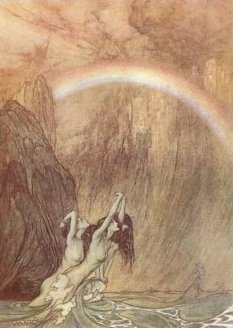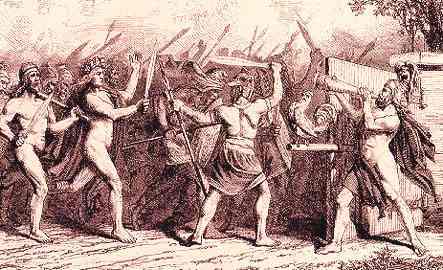
Myths of Northern Lands
By H. A. Guerber
CHAPTER XIII
HEIMDALL
The Watchman of the Gods
Odin was once walking along the seashore when he beheld nine beautiful giantesses, the wave maidens, Gialp, Greip, Egia, Augeia, Ulfrun, Aurgiafa, Sindur, Atla, and Iarnsaxa, sound asleep on the white sand. To secure possession of these charming girls was not much trouble for the god of the sky, who married all nine of them at once, and was very happy indeed when they simultaneously bore him a son called Heimdall.
"Born was I of mothers nine,
Son I am of sisters nine."
SÆMUND'S EDDA (Thorpe's tr.)
The nine mothers now proceeded to nourish this babe on the strength of the earth, the moisture of the sea, and the heat of the sun, which singular diet proved so strengthening that the new god acquired his full growth in a remarkably short space of time, and hastened to join his father in Asgard. There he found the gods proudly contemplating the rainbow bridge Bifrost, which they had just constructed out of fire, water, and air, which three materials can still plainly be seen in its long arch, where glow the three primary colors: the red representing the fire, the blue the air, and the green the cool depths of the sea.
The Guardian of the Rainbow
Fearing lest their enemies, the frost giants, should make their way over this bridge, which, connecting heaven and earth, ended under the shade of the mighty world tree Yggdrasil, close beside the fountain where Mimir kept guard, the gods bade the white-clad Heimdall watch it night and day.

Rainbow. Arthur Rackham
"Bifrost i' th' east shone forth in brightest green;
On its top, in snow-white sheen,
Heimdal at his post was seen."
OEHLENSCHLÄGER (Pigott's tr.)
To enable their watchman to detect the approach of any enemy from afar, the assembled gods gifted him with very keen senses, for he is said to have been able to hear the grass grow on the hillside, and the wool on the sheep's back, to see plainly one hundred miles off by night as well as by day, and to have required less sleep than a bird.
"'Mongst shivering giants wider known
Than him who sits unmoved on high,
The guard of heaven, with sleepless eye."
LAY OF SKIRNER (Herbert's tr.)
Heimdall was further provided with a flashing sword and a marvelous trumpet, called Giallar-horn, which the gods bade him blow whenever he saw their enemies draw near, declaring that its sound would rouse all creatures in heaven, earth, and Nifl-heim; would announce that the last day had come and that the great battle was about to be fought.
"To battle the gods are called
By the ancient
Gjallar-horn.
Loud blows Heimdall,
His sound is in the air."
SÆMUND'S EDDA (Thorpe's tr.)
To keep this instrument, which was a symbol of the moon crescent, ever at hand, Heimdall either hung it on a branch of Yggdrasil above his head or sank it in the waters of Mimir's well, where it lay side by side with Odin's eye, which was an emblem of the moon at its full.
Heimdall's palace, called Himinbiorg, was placed on the highest point of the bridge, and here the gods often visited him to quaff the delicious mead which he set before them.
"'Tis Himminbjorg called
Where Heimdal, they say,
Hath dwelling and rule.
There the gods' warder drinks,
In peaceful old halls,
Gladsome the good mead."
NORSE MYTHOLOGY
(R. B. Anderson)
Heimdall, always clad in resplendent white armor, was therefore called the bright god, as well as the light, innocent, and graceful god, all which titles he fully deserved, for he was as good as beautiful, and all the gods loved him. Connected on his mothers' side with the sea, he was sometimes counted among the Vanas; and as the ancient Northerners, and especially the Icelanders, to whom the surrounding sea appeared the most important element, fancied that all things had risen out of it, they attributed to him a knowledge of all things and imagined him particularly wise.
"Then said Heimdall,
Of Æsir the brightest -
He well foresaw
Like other Vanir."
SÆMUND'S EDDA (Thorpe's tr.)
This god was further distinguished by his golden teeth, which flashed when he smiled, and won for him the surname of Gullintani (golden-toothed). He was also the proud possessor of a swift, golden-maned steed called Gull-top, which bore him to and fro over the quivering rainbow bridge. This he crossed many times a day, but particularly in the early morn, when he was considered a herald of the day and bore the name of Heim-dellinger.
"Early up Bifröst
Ran Ulfrun's son,
The mighty hornblower
Of Himinbiörg."
SÆMUND'S EDDA (Thorpe's tr.)
Loki and Freya
Owing to his extreme acuteness of hearing, Heimdall was greatly disturbed one night by hearing soft, catlike footsteps in the direction of Freya's palace, Folkvang. Gazing fixedly towards that side with his eagle eyes, Heimdall soon perceived, in spite of the darkness, that the sound was produced by Loki, who stealthily entered the palace as a fly, stole to Freya's bedside, and strove to purloin her shining golden necklace Brisinga-men, the emblem of the fruitfulness of the earth.
As it happened, however, the goddess had turned in her sleep in such a way that he could not possibly unclasp the necklace without awaking her. Loki stood hesitatingly by the bedside for a few moments, and then rapidly began to mutter the runes which enabled the gods to change their form at will. As he was doing this, Heimdall saw him shrivel up until he was changed to the size and form of a flea, when he crept under the bedclothes and bit Freya's side, thus making her change her position without really rousing her.
The clasp was now free, and Loki, cautiously unfastening it, secured the coveted ornament, with which he proceeded to steal away. Heimdall immediately started out in pursuit of the midnight thief, and drawing his sword from its scabbard, was about to cut off his head when the god suddenly transformed himself into a flickering blue flame. Quick as thought, Heimdall changed himself into a cloud and sent down a deluge of rain to quench the fire; but Loki as promptly altered his form to that of a huge polar bear, and opened wide his jaws to swallow the water. Heimdall, nothing daunted, then assumed the form of a bear also, and fought fiercely with him; but the combat threatening to end disastrously for Loki, he changed himself into a seal, and, Heimdall imitating him, a last struggle took place, at the end of which Loki, vanquished, was forced to give up the necklace, which was duly restored to Freya.
In this myth, Loki is an emblem of the drought, or of the baleful effects of the too ardent heat of the sun, which comes to rob the earth (Freya) of its most cherished ornament (Brisinga-men). Heimdall is a personification of the gentle rain and dew, which, after struggling for a while with his foe the drought, manages to conquer him and force him to relinquish his prize.
Heimdall's Names
Heimdall has several other names, among which we find those of Hallinskide and Irmin, for at times he takes Odin's place and is identified with that god, as well as with the other sword-gods, Er, Heru, Cheru, and Tyr, who are all noted for their shining weapons. He, however, is most generally known as warder of the rainbow, god of heaven, and of the fruitful rains and dews which bring refreshment to the earth.
This god also shared with Bragi the honor of welcoming heroes to Valhalla, and, under the name of Riger, was considered the ancestor of the various classes which compose the human race, as is set forth in the following myth:
"Sacred children,
Great and small,
Sons of Heimdall!"
SÆMUND'S EDDA (Thorpe's tr.)
The Story of Riger
One day Heimdall left his place in Asgard to wander down upon the earth as the gods were wont to do. He had not gone very far ere he came to a poor hut on the seashore, where he found Ai (great grandfather) and Edda (great grandmother), a poor but worthy couple, who hospitably invited him to share their meager meal of porridge. Heimdall, who gave his name as Riger, gladly accepted this invitation, and remained with them three whole days, teaching them many things. At the end of that time he left them to resume his journey. Some time after his visit, Edda bore a dark-skinned, thickset male child, whom she called Thrall.
Thrall soon showed uncommon physical strength and a great aptitude for all heavy work; and having attained marriageable age, he took to wife Thyr, a heavily built girl with sunburnt hands and flat feet, who labored early and late, and bore him many children, from whom all the Northern serfs or thralls are descended.
"They had children,
Lived and were happy;
. . . . . . . . . . . . . . . . .
They laid fences,
Enriched the plow-land,
Tended swine,
Herded goats,
Dug peat."
RIGSMÁL (Du Chaillu's version)
Riger, in the mean while, had pursued his journey, and leaving the barren seacoast had pushed inland, where ere long he came to cultivated fields and a thrifty farmhouse. He entered, and found Afi (grandfather) and Amma (grandmother), who hospitably invited him to sit down and share their plain but bountiful fare.
Riger accepted this invitation also, remained three days with them, and imparted all manner of useful knowledge to his hosts. After his departure from their house, Amma gave birth to a blue-eyed sturdy boy, whom she called Karl. He soon revealed great skill in all agricultural pursuits, and married a buxom and thrifty wife named Snor, who bore him many children, from whom all husbandmen are descended.
"He did grow
And thrive well;
He broke oxen,
Made plows;
Timbered houses,
Made barns,
Made carts,
And drove the plow."
RIGSMÁL (Du Chaillu's version)
After leaving the house of this second couple, Riger went on until he came to a hill, upon which a stately castle was perched, and here he was received by Fadir (father) and Modir (mother), who, delicately nurtured and luxuriously clad, received him cordially, and set before him dainty meats and rich wines.

Heimdall Sounds Gjallarhorn at Ragnarok. Artist unknown
Riger tarried three days with them ere he returned to Himinbiorg to resume his post as guardian of the Asa-bridge; and the lady of the castle bore a handsome, slenderly built little son, whom she called Jarl. This child early showed a great taste for the hunt and all manner of martial exercises, learned to understand runes, and lived to do great deeds of valor which brought added glory to his name and race. Having attained manhood, Jarl married Erna, an aristocratic, slender-waisted maiden, who ruled his household wisely and bore him many children, all born to rule, the youngest of which, Konur, became the first king of Denmark according to this myth, which is illustrative of the marked sense of classes among the Northern races.
"Up grew
The sons of Jarl;
They brake horses,
Bent shields,
Smoothed shafts,
Shook ash spears.
But Kon, the young,
Knew runes,
Everlasting runes
And life runes."
RIGSMÁL (Du Chaillu's version)